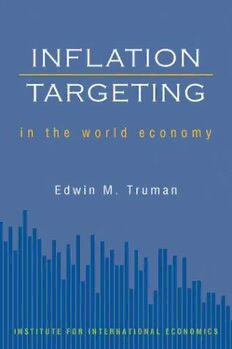
Inflation Targeting in the World Economy PDF
278 Pages·2003·0.944 MB·English
Most books are stored in the elastic cloud where traffic is expensive. For this reason, we have a limit on daily download.
Preview Inflation Targeting in the World Economy
Description:
The focus of this study is the potential contribution of inflation targeting as a framework for the conduct of monetary policy to the performance of the international financial system. First, it reviews the literature on the link between low inflation and higher economic growth and the adoption since 1989 of inflation targeting by almost 20 countries around the world. The study then considers whether the performance of the international financial system would be improved if the central banks of the G3 economies (the United States, Euroland and Japan) were to adopt inflation targeting. The author examines the challenges and opportunities presented by this option to other countries in light of their economic and financial circumstances, focusing on the emerging market economies and their exchange rate regimes. He concludes with a review of the implications of widespread adoption of inflation targeting for IMF-supported stabilization programmes and IMF conditionality.
See more
The list of books you might like
Most books are stored in the elastic cloud where traffic is expensive. For this reason, we have a limit on daily download.
